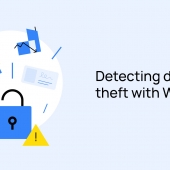-
New RustDoor macOS malware impersonates Visual Studio update
A new Rust-based macOS malware spreading as a Visual Studio update to provide backdoor access to compromised systems uses infrastructure linked to the infamous ALPHV/BlackCat ransomware gang.
- February 09, 2024
- 10:53 AM
 1
1
-
Apple 'Find My' network can be abused to steal keylogged passwords
Apple's "Find My" location network can be abused by malicious actors to stealthily transmit sensitive information captured by keyloggers installed in keyboards.
- November 04, 2023
- 10:12 AM
 0
0
-
France says Russian state hackers breached numerous critical networks
The Russian APT28 hacking group (aka 'Strontium' or 'Fancy Bear') has been targeting government entities, businesses, universities, research institutes, and think tanks in France since the second half of 2021.
- October 26, 2023
- 12:40 PM
 0
0
-
Discord still a hotbed of malware activity — Now APTs join the fun
Discord continues to be a breeding ground for malicious activity by hackers and now APT groups, with it commonly used to distribute malware, exfiltrate data, and targeted by threat actors to steal authentication tokens.
- October 16, 2023
- 05:29 PM
 4
4
-
Forever 21 data breach: hackers accessed info of 500,000
Forever 21 clothing and accessories retailer is sending data breach notifications to more than half a million individuals who had their personal information exposed to network intruders.
- August 31, 2023
- 03:23 PM
 0
0
-
New Android MMRat malware uses Protobuf protocol to steal your data
A novel Android banking malware named MMRat utilizes a rarely used communication method, protobuf data serialization, to more efficiently steal data from compromised devices.
- August 29, 2023
- 02:04 PM
 0
0
-
Mom’s Meals discloses data breach impacting 1.2 million people
PurFoods, which conducts business in the U.S. as 'Mom's Meals,' is warning of a data breach after the personal information of 1.2 million customers and employees was stolen in a ransomware attack.
- August 28, 2023
- 10:24 AM
 2
2
-
Apps with 1.5M installs on Google Play send your data to China
Security researchers discovered two malicious file management applications on Google Play with a collective installation count of over 1.5 million that collected excessive user data that goes well beyond what's needed to offer the promised functionality.
- July 06, 2023
- 02:43 PM
 12
12
-
Sponsored Content
Detecting data theft with Wazuh, the open-source XDR
Threat actors can steal data from organizations to sell to other malicious actors, making it a major risk for organizations. Wazuh, the free and open-source XDR/SIEM, offers several capabilities that protection against data theft.
- May 08, 2023
- 10:05 AM
 0
0
-
Microsoft: Clop and LockBit ransomware behind PaperCut server hacks
Microsoft has attributed recent attacks on PaperCut servers to the Clop and LockBit ransomware operations, which used the vulnerabilities to steal corporate data.
- April 26, 2023
- 07:28 PM
 0
0
-
Play ransomware gang uses custom Shadow Volume Copy data-theft tool
The Play ransomware group has developed two custom tools in .NET, namely Grixba and VSS Copying Tool, which it uses to improve the effectiveness of its cyberattacks.
- April 19, 2023
- 06:00 AM
 0
0
-
Vice Society ransomware uses new PowerShell data theft tool in attacks
The Vice Society ransomware gang is deploying a new, rather sophisticated PowerShell script to automate data theft from compromised networks.
- April 14, 2023
- 03:46 PM
 0
0
-
Ransomware gang posts video of data stolen from Minneapolis schools
The Medusa ransomware gang is demanding a $1,000,000 ransom from the Minneapolis Public Schools (MPS) district to delete data allegedly stolen in a ransomware attack.
- March 08, 2023
- 12:37 PM
 0
0
-
SCARLETEEL hackers use advanced cloud skills to steal source code, data
An advanced hacking operation dubbed 'SCARLETEEL' targets public-facing web apps running in containers to infiltrate cloud services and steal sensitive data.
- February 28, 2023
- 11:00 AM
 0
0
-
North Korean hackers stole research data in two-month-long breach
A new cyber espionage campaign dubbed 'No Pineapple!' has been attributed to the North Korean Lazarus hacking group, allowing the threat actors to stealthily steal 100GB of data from the victim without causing any destruction.
- February 02, 2023
- 12:56 PM
 0
0
-
Malicious ‘SentinelOne’ PyPI package steals data from developers
Threat actors have published a malicious Python package on PyPI, named 'SentinelOne,' that pretends to be the legitimate SDK client for the trusted American cybersecurity firm but, in reality, steals data from developers.
- December 19, 2022
- 12:00 PM
 0
0
-
Air-gapped PCs vulnerable to data theft via power supply radiation
A new attack method named COVID-bit uses electromagnetic waves to transmit data from air-gapped systems isolated from the internet over a distance of at least two meters (6.5 ft), where its captured by a receiver.
- December 10, 2022
- 10:06 AM
 7
7
-
Phishing drops IceXLoader malware on thousands of home, corporate devices
A ongoing phishing campaign has infected thousands of home and corporate users with a new version of the 'IceXLoader' malware.
- November 10, 2022
- 05:58 PM
 0
0
-
Medibank now says hackers accessed all its customers’ personal data
Australian insurance firm Medibank has confirmed that hackers accessed all of its customers' personal data and a large amount of health claims data during a recent ransomware attack.
- October 26, 2022
- 10:30 AM
 0
0
-
TommyLeaks and SchoolBoys: Two sides of the same ransomware gang
Two new extortion gangs named 'TommyLeaks' and 'SchoolBoys' are targeting companies worldwide. However, there is a catch — they are both the same ransomware gang.
- October 22, 2022
- 11:12 AM
 0
0

























